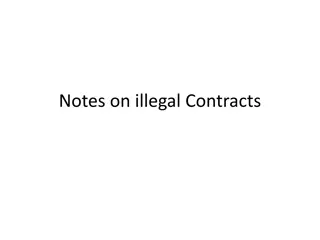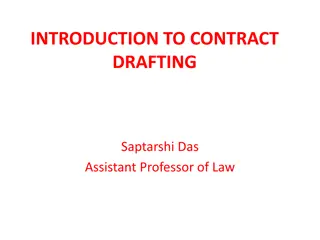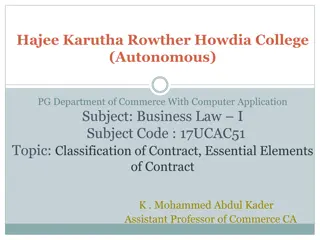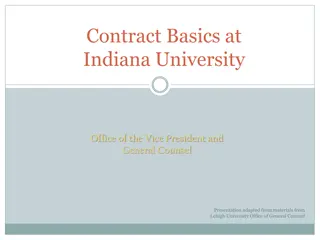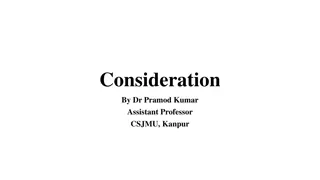Overview of Special Contracts in Indian Contract Act
The Indian Contract Act contains special contracts including Contract of Indemnity, Guarantee, Bailment, Pledge, and Agency. This overview covers the definitions, parties involved, and rights of the parties in Contract of Indemnity and Guarantee.
Download Presentation

Please find below an Image/Link to download the presentation.
The content on the website is provided AS IS for your information and personal use only. It may not be sold, licensed, or shared on other websites without obtaining consent from the author. Download presentation by click this link. If you encounter any issues during the download, it is possible that the publisher has removed the file from their server.
E N D
Presentation Transcript
Chapter-III Special Contracts Contains 1.Contract of Indemnity 2.Contract of Guarantee 3.Contract of Bailment 4.Contract of Pledge 5.Contract of Agency
Introduction- Indemnity It is a type of contingent contract. If loss is actually take place then only the contract is performed. Indemnity holder can not make profit out of loss. All essentials of valid contract must be full filled. If the object is void or against public policy contract of indemnity becomes void.
Contract of Indemnity-Definition Section 124 of Indian Contract Act defines contract of Indemnity as A contract by which one party promises to save other from loss caused to him by the conduct of promisor himself or by the conduct of other party. For Example Marine Insurance Policy,
Parties in contract of Indemnity Indemnity Holder The person whose loss is to be compensated is call as Indemnity holder Indemnifier The person who promise to cover loss is called as Indemnifier
Rights of Indemnity Holder *An indemnity holder can cover 1.All damages which he paid for any suit. 2.All cost in bringing or defending any such suit. 3.All cost which he might have paid to compromise any such suit. Rights of Indemnifier-The act is silent about the rights of Indemnifier they are similar to the rights of surety in the contract of Guarantee.
2. Contract of Guarantee Introduction Contract of Guarantee is formed for the purpose of 1.Getting loan, good on credit, employment 2.Commercial engagement, assure honesty 3.Indemnify other party in case of breach of contract.
Contract of Guarantee. Definition-Section 126 of Indian contract Act defines contract A contract to perform a promise or to discharge the liability of a third person in case of his default of guarantee as
Parties to contract of Guarantee Principal Debtor Surety Creditor The Person for whom the guarantee is given The person to whom the guarantee is given The Person who gives guarantee
Essential of Valid Guarantee 1.Existance of Principal debt. Ex. If creditor has not given any loan to principal debtor there is no contract of guarantee 2.Considration Ex. There is no need of direct consideration between surety and principal debtor 3.No misrepresentation or concealment Ex. If surety has given his guarantee for specific transaction, creditor or principal debtor can not use it for other transactions also. (Only for vehicle loan and not for home loan) 4.Writing not necessary
Kinds of Guarantee 1.Specific Guarantee-Guarantee for specific debt or for specific performance Ex. Mr. A give his guarantee to shopkeeper in favor of Mr. B for credit purchase of cycle. 2.Continuing Guarantee:-Which extend to a series of transactions Ex-One retailer extend his guarantee in favor of another retailer at Wholesaler for anytime purchase.
Rights of Surety Against Creditor Against Co-sureties Against Principal Debtor to Security Right of Subrogation (Obtain all rights like creditor if paid debt of principal debtor) to set off to exoneration Right to claim Indemnity
Discharge of Surety 1.Revocation by notice 2.Revocation by death 3.Discharge by variation terms in contract 4.Release or discharge of principal debtor 5.Discharge due to compromise or extension of time (creditor accept less amount to cover loan) 6.By creditor s action or omission 7.If the creditor loosing its security. 8.By concealment or misrepresentation.
Difference between indemnity and Guarantee Point of Difference Indemnity Guarantee Purpose of Contract To cover the loss if take place For the security of the creditor No. of parties Two Parties Indemnifier Indemnity holder Three Parties Creditor Principal Debtor Surety No of Contract One between Indemnifier and Indemnity holder Three Sub contracts between Creditor - Principal Debtor and surety. Liability Liability of indemnifier is primary Liability of surety in secondary It arise only if principal debtor fails Need of performance Only if loss occurs (Contingent Contract) Only if principal debtor fails to repay his liability
Contract of Bailment Sec.148. A bailment is the delivery of goods by one person to another for some purpose, upon a contract that they shall ,when the purpose is accomplished, be return or otherwise disposed off according to the directions of the person delivering them
Characteristic/essentials of Bailment 1.Subject Matter of Bailment Car to repair/cloth to stitch/cloth to iron 2.Delivery of Goods Car at Garage/cloth to laundry etc. 3.Purpose of Delivery Repair of car/ ironing of clothes etc. 4.Return or disposal of goods Repaired car/stitched cloth etc.
Parties of Bailment The person who transfer his goods to bailee for specific purpose Ex. Car owner, Cloth owner Bailor The person who accepts the goods of bailor for specific propose Ex. Car mechanic, tailor etc. Bailee
Types of Bailment 1.Gratetious Bailment. If no consideration passes between bailer and bailee.(A lends his car to his friend for a journey.) 2.Non gratuitous bailment (A lends his car to a customer for a journey With some consideration)
Rights and duties of bailor Rights of Bailor:- 1.Enforcement of duties 2.Cancellation of bailment 3.Return of goods lent gratuitously Duties of Bailor:- 1.Duty to disclose known defects 2.Duty to bear extraordinary expenses of bailment 3.Duty to indemnify bailee 4.Duty to receive back the goods 5.Duty to compensate the gratuities bailee
Rights of bailee :- 1.Right to compensation 2.Right to remuneration or expenses 3.Right to apply to court to stop delivery 4.Right to deliver goods to any one of the several bailers 5.Right to lien A. Particular Lien B. General Lien
Duties of Bailee 1.To take care of bailed goods 2.Not to make un authorized use of goods 3.Not to mix bailed goods with his own goods 4.Duty to return the goods. 5.Duty to return any increase in goods 6.Duty not to set up any adverse title against the bailor.
Contract of Pledge Introduction:- 1.A pledge is a bailment for security. 2.It is a special kind of bailment. 3.Any kind of movable property may be pledge Ex. Goods, documents or valuable 4. Delivery is necessary for pledge.
Definition Bailment of goods as security for the payment of a debts or performance of a promise is called pledge Bailor is called pawnor or pledger, Bailee is called pawnee or pledgee.
Essential of Pledge 1.Delevery of Goods :- A contract of pledge occurs only after transfer of possession of goods ,not ownership 2.Contract :- Contract of pledge should be based on valid consideration and with all essentials 3.Security :- Pledge is always made as a security for the payment of debt or performance
Difference between Bailment and pledge Point of difference Bailment Pledge Nature of contract Bailment of goods for a specific purpose Ex. Giving Gold to goldsmith for making ornaments Bailer has a right to lien (Withhold an article) but no right of sale. Bailment of goods for security Ex. Giving gold to Creditor as security. Right to lien Pladgee /Pawnee may sale the goods after giving notice to pownor Right to use goods Bailer has a right to use the goods as per the terms of contract Ex. Trial by car mechanic Bailee is bound to return the goods on bailor s demand Pawnee has no right to use the goods Return the goods Pawnee is not bound to return the goods on pownor s demand.
Rights of Pawnee 1.Right of Retainer retain the pledged goods until the dues are paid.(Also collect 2.Right of retainer for subsequent advance 3.Right to extraordinary expenses 4.Right to sale
Drop your suggestions at - sachinprayag1@gmail.com Contact- 9881717278 OR Dr. Sachin M. Prayag. Assistant Professor. Department of Commerce, Govindlal Kanhaiyalal Joshi (Night) Commerce College, Latur. Thank You !!! Dr.Sachin M.Prayag




